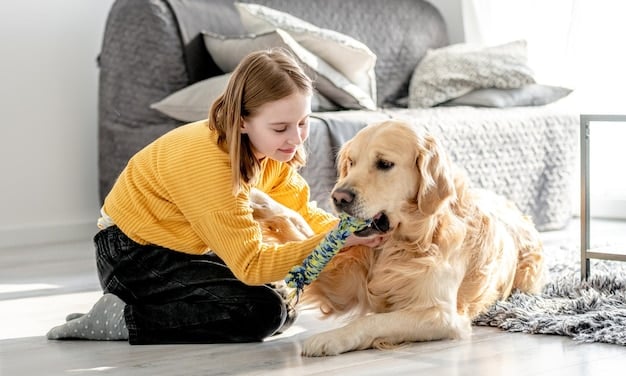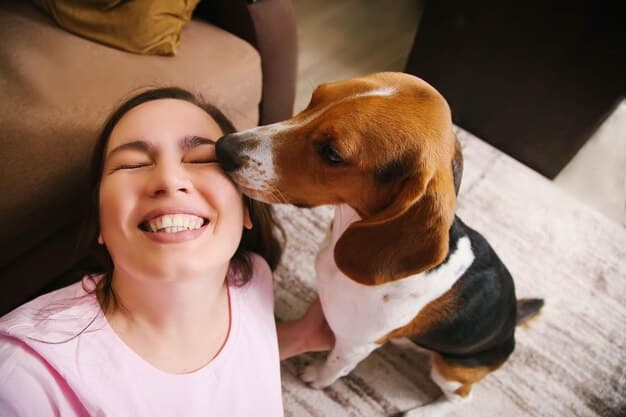Boost Your Dog’s Mental Health: The Power of 15 Minutes of Play

Anúncios
New Study: How 15 Minutes of Daily Play Can Boost Your Dog’s Mental Health: This research highlights that just 15 minutes of daily play significantly improves a dog’s cognitive functions, reduces stress, and enhances their overall well-being, making it a simple yet effective way to care for your furry friend.
A recent study reveals that dedicating just 15 minutes to daily play can profoundly impact your dog’s mental health. The New Study: How 15 Minutes of Daily Play Can Boost Your Dog’s Mental Health underscores the importance of incorporating regular playtime into your dog’s routine for a happier, healthier companion.
Anúncios
The Surprising Science of Playtime and Dogs
It’s no secret that dogs love to play. But did you know that playtime is more than just fun and games? Recent research has shed light on the profound impact of daily play on a dog’s cognitive and emotional well-being. Understanding this science can help you provide the best possible care for your beloved pet.
Why Playtime Matters for Mental Health
Playtime is essential for stimulating a dog’s mind. Engaging in games and activities helps to keep their cognitive functions sharp and active. When dogs play, they are problem-solving, learning, and using their natural instincts.
Anúncios
The Cognitive Benefits of Play
Regular play enhances various cognitive abilities, such as memory, attention, and problem-solving skills. These benefits contribute to a dog’s overall intelligence and adaptability.
- Enhances cognitive function and alertness.
- Reduces boredom and destructive behaviors.
- Strengthens the bond between dog and owner.
- Provides an outlet for energy and natural instincts.
Incorporating playtime into your dog’s daily routine is not just about keeping them entertained; it’s about actively contributing to their mental fitness and overall happiness. Make time each day to engage in activities that your dog enjoys, and you’ll see a noticeable difference in their demeanor and cognitive abilities.
The Study: 15 Minutes to a Happier Dog
The groundbreaking study that brought this information to light focused on the effects of 15 minutes of daily play on dogs of various breeds and ages. Let’s dive into the key findings and methodologies of this insightful research.

Researchers monitored a group of dogs. One group had the inclusion of 15 minutes of play, and the other group kept their usual routine. The results showed a correlation between play and mental well-being.
Methodology of the Study
The study involved diverse breeds, ages, and sizes to provide broad insights. Researchers used cognitive tests and behavioral assessments to evaluate the dogs before and after the intervention period.
Key Findings Revealed
The most significant finding was that dogs who engaged in 15 minutes of daily play exhibited marked improvements in cognitive functions, reduced stress levels, and enhanced social interactions.
The study’s methodology and findings provide a clear picture of the advantages of incorporating a little play into their lives. Just a small amount of dedication can go a long way to making your dog’s life more enriched.
Recognizing Signs of Mental Health Issues in Dogs
Just like humans, dogs can experience mental health challenges. Recognizing the signs of these issues is crucial for providing timely and appropriate care. Here’s what to watch out for.
Changes in behavior can indicate underlying stress or anxiety. A dog that is normally playful might become withdrawn, or a social dog might start showing aggression.
Common Signs of Stress and Anxiety
Physical symptoms can also manifest, such as digestive issues or changes in appetite. Some dogs might excessively lick or chew themselves, leading to skin irritations.
Behavioral Changes to Watch For
- Excessive barking or whining
- Destructive chewing or digging
- Changes in sleep patterns
- Loss of interest in activities they once enjoyed
Recognizing these signs early can help you seek timely veterinary or behavioral advice. Addressing these issues promptly can significantly improve your dog’s quality of life and overall well-being.
Types of Play That Benefit Your Dog’s Mind
Not all play is created equal when it comes to mental stimulation. Different types of play engage various parts of your dog’s brain. Knowing which types of play are most beneficial can help you tailor your playtime sessions.
Interactive games like fetch or tug-of-war encourage mental engagement and physical activity. They also reinforce the bond between you and your dog, leading to a happier and more secure pet.

Interactive Games to Try
Puzzle toys and brain games force your dog to think critically and problem-solve. These toys provide mental stimulation and can keep your dog entertained for extended periods.
The Power of Puzzle Toys
Scent work involves using your dog’s natural sense of smell to find hidden objects or treats. This type of play is highly engaging and can tire your dog out mentally, even if they aren’t physically active.
- Fetch with a twist: Vary the throwing distance or hide the ball.
- Tug-of-war with rules: Teach your dog to release on command.
- Hide-and-seek: Hide treats or toys around the house for your dog to find.
Tailoring to their specific interests can provide more enjoyment for your pet. A tired dog is a good dog.
Creating the Perfect Playtime Routine
Establishing a regular playtime routine can significantly enhance the benefits of play for your dog’s mental health. Consistency is key to making playtime a predictable and enjoyable part of your dog’s day.
Set aside the same time each day for playtime. Dogs thrive on routine, and knowing when to expect playtime can reduce anxiety and increase anticipation.
Scheduling Playtime for Consistency
Create a designated play area free from distractions. This helps your dog focus on the activity and minimizes potential risks.
Designing a Safe and Fun Play Area
Observe your dog’s preferences and tailor the playtime activities accordingly. Some dogs prefer fetch, while others enjoy puzzle toys or scent work.
- Start with short, focused sessions and gradually increase the duration.
- End each session on a positive note to reinforce good behavior.
- Be mindful of your dog’s energy levels and adjust activities as needed.
Long-Term Benefits of Consistent Play
The benefits of consistent play extend far beyond immediate entertainment. Regular playtime can have lasting positive effects on your dog’s mental and physical well-being. A consistent playtime routine can increase mental well-being leading to positive changes in your dog.
Improved Cognitive Function Over Time
Continuous mental stimulation through play helps maintain cognitive sharpness as dogs age. This can reduce the risk of cognitive decline and improve their overall quality of life.
Stronger Bond Between Dog and Owner
Playtime strengthens the bond between you and your dog, fostering a deeper connection. This bond contributes to a sense of security and love, which is essential for their emotional well-being.
- Reduced risk of age-related cognitive decline.
- Enhanced emotional stability and resilience.
- A happier, healthier, and more engaged companion.
Incorporate play into you and your pet’s daily lives and watch as they live more enriched and happy lives.
| Key Point | Brief Description |
|---|---|
| 🧠 Cognitive Boost | 15 minutes of play daily enhances cognitive functions in dogs. |
| 🐾 Reduce Stress | Playtime helps lower stress levels, leading to a more relaxed dog. |
| ❤️ Bond Strengthener | Play creates a stronger, more loving connection between you and your dog. |
| 🗓️ Daily Routine | Consistent playtime schedules offer predictability and decrease anxiety. |
Frequently Asked Questions
▼
Play provides mental stimulation, reduces boredom and stress, and encourages physical activity, all of which contribute to a happier, healthier mental state for your dog.
▼
Interactive games, puzzle toys, and scent work are all excellent for engaging your dog’s mind. Choose activities that match your dog’s preferences and energy levels.
▼
Look for changes in behavior, such as increased anxiety, aggression, or withdrawal. Physical symptoms can also indicate underlying stress and mental health concerns.
▼
According to the study, just 15 minutes of daily play can make a significant difference. Consistency is key, so try to incorporate a short playtime session into your dog’s daily routine.
▼
Experiment with different types of play to find what your dog enjoys. Start with gentle encouragement and positive reinforcement. You might also consult with a dog trainer or behaviorist for guidance.
Conclusion
Incorporating just 15 minutes of daily play into your dog’s routine can significantly boost their mental health. By understanding the science behind playtime, recognizing signs of mental health issues, and tailoring your approach to your dog’s specific needs, you can greatly improve their overall well-being and strengthen your bond.






